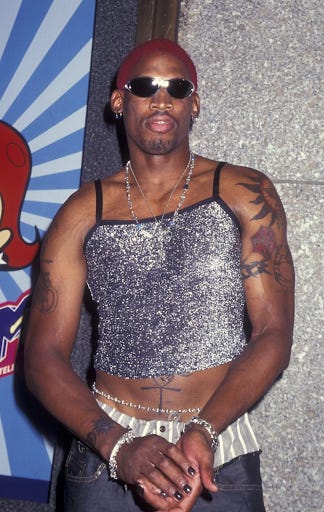In the realm of men’s sports, fashionable game day outfits have become increasingly more common. Although some of the athletes don low-key and casual wear, other outfits range from effortless streetstyle to vibrant expression through designer brands. In leagues such as the NBA, these pre-game outfits or “tunnel fits” have become such an iconic aspect of the sport, that there are even instagram pages dedicated to them. One account being nbafashionfits with 242 thousand followers.

However, this fashion forward movement extends beyond gamedays and beyond the NBA as well. It is seen in leagues across the world such as La Liga Spain’s soccer (or football) league, to Formula One featuring motor racing across five continents. Additionally, these sportsmen continue to engage with fashion in varying degrees outside of these “tunnel fits,” whether it be attending Paris Fashion Week events or posing on the cover of Vanity Fair. However among these athletes, black men stand out as distinct pioneers of fashion within the world of sports.
A true maverick and a uniquely controversial figure, Dennis Rodman, proves to be a standout player from the 90s basketball scene for various reasons. Before discussing his contributions to fashion and his eccentric style, it should be noted that Rodman had a myriad of legal issues relating to domestic violence and sexual assault, and shared a close relationship with Kim Jong Un. By highlighting his contributions to fashion, I do not intend to disregard the severity and implications of these actions.
Rodman is widely regarded as one of the best rebounders of all time, and is further celebrated for his achievements alongside Michael Jordan and Scottie Pippen on a Chicago Bulls team that won three straight championships. Beyond his standout performances on defense, Rodman was distinctly recognizable for his bright, vivid hair, painted nails, and eccentric clothes. The 1995 VMAs displays every way in which he stood out amongst his contemporaries. Fit with a cropped, glittery spaghetti-strapped tank that revealed silver studs in his navel, adorned with matching silver bracelets, necklaces and earrings, accompanied by a neat, glossy manicure, Rodman cut a striking image.
Many components of this ensemble challenged persisting gender roles relating to fashion at the time. Although these gender roles seem less stringent in current day, with male celebrities like Young Thug or Harry Styles embracing traditionally “feminine” aspects of fashion, Dennis Rodman stood out among his peers in the NBA. Not only did Rodman’s unadulterated expression of self put him at odds with gender based expectations, but it also combatted ones centered around race. This includes increased stigma from the black community due to internal thoughts of what a black man should be, coupled with the perception of black manhood from those outside of the community.
In the thirty years since Dennis Rodman’s era, black sportsmen have continued to make their impact through fashion.Since its conception in 1946, Formula One has featured 775 different drivers as of the 2023 Japanese Grand Prix. However, across almost 800 drivers and almost 80 years, Sir Lewis Hamilton (he was knighted by the Prince of Wales in 2021) is the only black driver to ever race in Formula One. Being the only black driver in a historically white sport, plus holding seven Driver’s Championship titles easily makes Hamilton a distinctive figure within the sport. However, throughout his tenure in F1 and the spotlight, Hamilton has grown into a fashion icon. The seven-time world champion has developed a striking and chic fashion sense which he often shows off on race days on the paddock. Often clad in a monochrome fit, or a matching set paired with smart accessories, he never fails to make a statement.
Hamilton’s sense of style and interest in fashion has put him at odds with several aspects of his identity. One being his position as a Formula One driver. Formula One has historically been a sport dominated by rich, white, European men who strive to maintain a strong sense of traditionalism and exclusivity in the sport. And although Hamilton is very rich himself, his presence and these mere “paddock fits” represent a deviation from the antiquated values surrounding Formula One.

Furthermore, Hamilton has drawn more and more criticism due to explorations beyond motor-racing. He has dabbled in a multitude of different things like film production and acting (he was almost in Top-Gun Maverick!), and he even has released music under the pseudonym XNDA. But more significantly, the driver has been incredibly involved in the world of fashion; whether it be attending the Met Gala and Paris Fashion Week, to gracing the cover of Vanity Fair, and running his own clothing line +44.
The criticism that Hamilton draws brings forth an interesting discussion relating to athletes and the expression of their interests beyond sports. This relates to the larger occurrence of the commodification of athletes, and the diminishment of their identity and interests outside of the sport they play. It's important to note that although this is perpetuated on a corporate level, we, as fans and spectators, also contribute to this harmful belief.
Athletes like Dennis Rodman and Hamilton have stood at the forefront of these sport leagues which garner millions upon millions of viewers worldwide, which has only been compounded by the meteoric rise of social media. With this audience, athletes prove to wield an incredible amount of influence. And with this influence, today, we see black male athletes leave their own impression on the world of fashion, through fashion week appearances, running their own shoe or clothing lines, and more.
Beyond leaving an impact upon the world of fashion, they also leave a lasting impact on their audience as they combat antiquated and restrictive ideals surrounding what it means to be man, what it means to be black, what it means to be an athlete, or any combination of these aspects of identity.








such an informative and well written article!!
So well written❤️